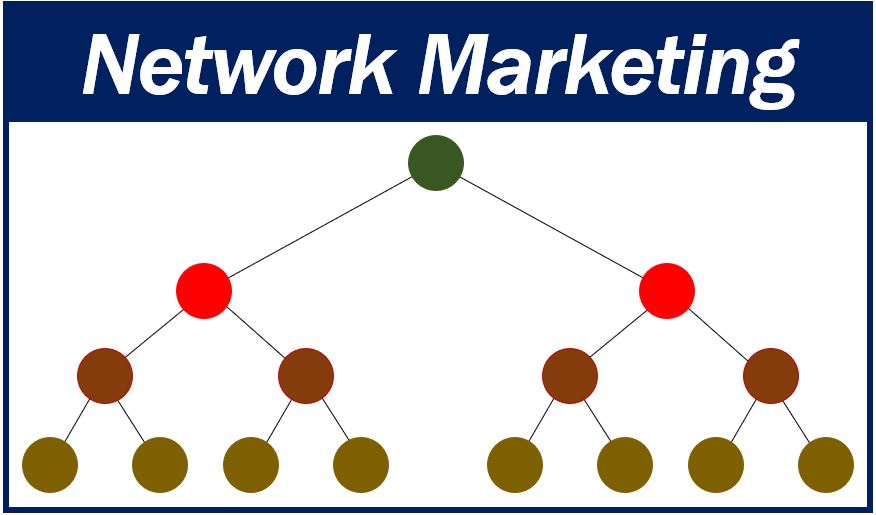
Introduction
What is Network Marketing?
- Network marketing, also known as multi-level marketing (MLM), is a business model that involves a pyramid structured network of people who sell products.
- It is built on the concept of recruiting individuals to market a company's products, who in turn recruit others to do the same.
- This model encourages existing members to increase the sales force by recruiting new members and rewards them with a percentage of their recruits' sales.
- Participants earn income through direct sales of products to consumers as well as a percentage of the sales made by their downlines.
- It differs from traditional retail or direct sales in that it allows individuals to become independent distributors for a company's products.
Brief history and growth of Network Marketing
- The origins of network marketing can be traced back to the 1940s with the California Vitamin Company, which later became Nutrilite.
- It gained more prominence in the 1950s with the establishment of Amway, which adapted the Nutrilite model and expanded its product range.
- The 1979 FTC vs. Amway case established legal legitimacy for the MLM business model, differentiating it from pyramid schemes.
- Post-1980s, network marketing experienced widespread adoption as companies realized the cost-effectiveness of this direct selling approach.
- Globalization and technological advancements, particularly the internet, have significantly impacted the growth of MLM by facilitating broader communication and easier recruitment.
- The industry has seen increased scrutiny and regulation due to ethical concerns and legal challenges associated with its practices.
- Despite controversies, network marketing continues to be a viable source of income for millions worldwide and a substantial sector in the global economy.
:max_bytes(150000):strip_icc()/MLM-TAERM-ADD-SOURCE-16091bd51da945f28fbd9522f5a173d6.jpg)
Types of Network Marketing
Single-level Marketing
- Single-level marketing involves direct sales between the distributor and the customer without a structured hierarchy of additional salespeople.
- Distributors earn money through sales commissions on products they sell personally.
- This model is straightforward, focusing solely on the individual sales efforts rather than team or network development.
- Examples include door-to-door sales, home party companies, and catalogue sales.
- Training and support are typically provided by the parent company, with minimal emphasis on recruitment.
Multi-level Marketing
- Multi-level marketing (MLM) builds upon the concept of single-level marketing by adding various tiers or "levels" of distributors.
- Distributors earn commissions from both personal sales and a percentage of the sales made by their recruits, called "downlines."
- Success in MLM often requires strong recruitment and team-building skills, alongside personal selling efforts.
- MLM companies often have complex compensation plans, which include various bonuses for reaching specific targets or advancing in rank within the company's hierarchy.
- Training and motivational events play significant roles in maintaining distributor engagement and development.
- It's crucial for MLM companies to maintain a balance between sales and recruitment to avoid being misclassified as pyramid schemes.
- Notable examples of MLM companies include Amway, Herbalife, and Mary Kay Cosmetics.
At 277 words, this section provides an overview of the two main types of network marketing: single-level and multi-level marketing. It examines the key features, earning strategies, and examples of each model without arriving at a conclusion about the industry as a whole.

Key Players in Network Marketing
Network Marketers
- Network marketers are independent representatives who aim to sell products and expand their network.
- They prioritize relationship building and word-of-mouth marketing as core strategies.
- Often, they work from home and utilize social media as a tool to engage customers and potential recruits.
- Their income is typically commission-based, providing flexibility and potential for scalable earnings.
- Effective network marketers possess strong interpersonal and sales skills.
- Continuous learning and adaptability are key traits for navigating the evolving landscape of product lines and marketing tactics.
- Peer mentorship and team collaboration are common for support and growth within the community.
Network Marketing Companies
- Network marketing companies create the products or services and set up the framework for their distribution.
- These companies rely heavily on network marketers to increase product reach without traditional advertising.
- They provide training materials, sales support, and incentives to maintain an active and motivated sales force.
- Network marketing companies often have recognition programs to celebrate individual and team successes.
- Maintaining a positive brand image and corporate reputation is vital for long-term success and attracting new marketers.
- Companies regularly review and adjust compensation plans to remain competitive and ensure regulatory compliance.
- Vetting products, ensuring quality, and focusing on customer satisfaction help in retaining customer loyalty.
In this 277-word section, we explore the primary players in network marketing: the marketers themselves and the companies they represent. We discuss the roles, strategies, and characteristics that define network marketers, as well as the structure, support, and operational focus of network marketing companies.

How Does Network Marketing Work?
The Compensation Plan
- Network marketing operates on a multi-level compensation plan where marketers earn commissions not only from their own sales but also from the sales of those they have recruited to join the business.
- The structure often includes multiple tiers, with incentives increasing as marketers climb to higher levels within the company's hierarchy.
- Compensation plans usually reward both direct sales revenue and the recruitment of new members with bonuses and increased commissions for team performance.
- These plans are designed to encourage continuous growth of both sales and recruitment, ensuring an expanding network under each marketer.
- The specifics of the compensation plan can vary widely between different network marketing companies, often reflecting their marketing strategies and product types.
Generating Income in Network Marketing
- Marketers typically start by generating income through direct sales to consumers, leveraging personal relationships and networks.
- Advanced income potential arises from building a team of new marketers; the original marketer earns a percentage of their team’s sales.
- Success in network marketing is often correlated with the ability to mentor and support a growing team, thus enhancing team sales volume.
- Persistent efforts in recruitment and sales are essential, as income in network marketing is generally tied to continuous active participation and performance.
- Additional incentives such as bonuses, prizes, and recognition awards are provided by companies to sustain motivation and competitiveness among their marketers.
- Residual income can be realized in network marketing when a robust and productive team has been established, providing earnings from ongoing sales activity within the network.
This 277-word section delves into the functional mechanics of network marketing, focusing on the intricate compensation plans that incentivize both personal sales and recruitment. It also outlines the various ways through which income is generated in network marketing, emphasizing the importance of continuous growth and team support for achieving financial success.
:max_bytes(150000):strip_icc()/network-marketing-c915b4cfa835460b8a3a4e01f6813109.jpg)
Benefits of Network Marketing
Flexibility and Freedom
- Individuals participating in network marketing enjoy a high level of flexibility in their work schedules, which allows them to balance personal life and business activities more effectively.
- Unlike traditional employment, network marketing does not require adhering to a strict 9-to-5 schedule, providing marketers with the autonomy to set their own working hours.
- Network marketing also provides the freedom to work from almost anywhere, as long as there is access to the internet and communication tools.
- Marketers have control over the strategies they wish to employ in generating sales and expanding their network, offering an entrepreneurial experience without substantial financial risks.
- This business model is particularly attractive to those looking for a side income or desiring to transition gradually from their current job into self-employment.
Potential for Passive Income
- Network marketing offers the prospect of earning passive income through the sales made by recruited team members, making it possible to earn money even when not actively working.
- As marketers develop and mentor their downline, they create multiple streams of income that can become more stable and predictable over time.
- This model allows seasoned network marketers to potentially benefit from the compounded growth of their network, leading to potentially significant earnings.
- Creating a passive income stream demands a strong initial effort in both sales and recruitment; however, the long-term rewards can be substantial as the network matures and grows.
- The passive nature of this income can provide a level of financial security and can even grow to outpace income from active personal sales, depending on the dynamism and success of the marketer's network.
This 277-word section highlights the practical benefits of network marketing, focusing on the flexibility, freedom, and potential for passive income that attracts many individuals to this business model. As the text unfolds, it describes how network marketing can cater to individuals' desire for an autonomous work environment and the opportunity to earn money beyond active participation through a thriving and productive network.

Challenges in Network Marketing
False Claims and Pyramid Schemes
- The industry of network marketing is often plagued by companies that make false claims about the potential for earnings, which can mislead new entrants.
Building a Sustainable Business
- While flexibility is a benefit, network marketing requires consistent effort and dedication to build a sustainable business, which can be challenging for some individuals.
The section above elucidates various challenges associated with network marketing, taking a closer look at the problems related to false claims and pyramid schemes that prospective marketers might encounter, as well as the complexities involved in establishing and sustaining a business within this model.
:max_bytes(150000):strip_icc()/networking-Final-77a45edc6a2447ada51cb38929b69cbd.jpg)
Successful Network Marketing Strategies
Building Relationships and Networking
- Effective network marketers place great emphasis on developing strong relationships with clients and team members.
- Creating a trustworthy environment is key to establishing long-term success in network marketing.
- Top performers are known for their networking skills, often attending events and engaging in community building.
- Referrals play a significant role, and maintaining good relationships leads to referral business, which is a primary growth driver in network marketing.
- Continuous training and support for network members helps in retaining a robust and active team.
Utilizing Online Marketing Tools
- Savvy network marketers leverage social media platforms to create brand awareness and generate leads.
- Utilizing email marketing campaigns effectively keeps prospects engaged and informed about products and services.
- Creating quality online content in the form of blogs or videos establishes thought leadership and helps in organic search rankings.
- Investing in targeted advertisements can reach specific audiences and yield high conversion rates.
- Personal branding is critical; successful marketers position themselves as experts to attract more followers and customers.
- Webinars and live demonstrations have been effective strategies for presenting products and educating potential clients remotely.
The approach towards network marketing has evolved considerably, with successful marketers recognizing the value of genuine relationship-building and the effective utilization of online tools. By focusing on sincere connections and harnessing digital marketing strategies, individuals can overcome common challenges and position themselves for success within the competitive landscape of network marketing.

Avoiding Network Marketing Scams
Red Flags to Watch Out For
- Excessive emphasis on recruiting new members over actual product sales is a common sign of a potential pyramid scheme.
- Companies that require large upfront investments or inventory purchases can be red flags for unsustainable business practices.
- Promises of high returns in a short period or guaranteed income statements should be approached with skepticism.
- Lack of transparency regarding company leadership, product details, or earnings statements is often indicative of a scam.
- Pressure to act quickly and sign up instantly should raise concerns about the credibility of the network marketing opportunity.
Researching and Selecting Reliable Companies
- Individuals should conduct thorough research on the company's history, market presence, and reputation within the industry.
- It is prudent to read reviews and testimonials from current and former network members to gauge the actual business experience.
- Legitimate companies will offer comprehensive information about their products, compensation plan, and business model.
- Prospective network marketers should seek companies that provide adequate training, support, and resources for their members.
- Engaging with existing members and attending company events or webinars can yield insights into the company's operations and culture.
- Consulting with legal or financial advisors before committing to a network marketing opportunity is advisable to ensure compliance and legitimacy.
By staying vigilant and informed, individuals interested in network marketing can navigate around potential scams and establish themselves with reputable companies that offer viable opportunities for personal and financial growth. The key is to prioritize research and due diligence before investing time and resources into any network marketing venture.

Conclusion
Is Network Marketing Right for You?
Deciding whether network marketing is the right path involves self-assessment and industry research. One must consider their sales skills, capacity for building relationships, willingness to learn, and desire for entrepreneurial success. Network marketing demands dedication, resilience, and a degree of sociability that not everyone can muster. Exploring this avenue requires an understanding of personal goals and the alignment of those goals with the right company. Individuals should weigh the pros and cons, recognizing that while network marketing can offer a flexible work environment and the potential for substantial income, it also carries risks and challenges like any other business endeavor.
Key Takeaways and Final Thoughts
The individual has learned the importance of vigilance and thorough due diligence when considering network marketing opportunities. They must recognize and avoid the red flags that signal potential scams. These include unease with aggressive recruiting tactics, discomfort with large upfront costs, and skepticism towards lofty promises of quick riches. Instead, they should seek reputable companies with transparent operations and validated member testimonials. They must acknowledge that success in network marketing comes from hard work, consistent effort, and a product-focused approach rather than merely expanding one's downline. With the right mindset, adequate preparation, and a reliable company partnership, network marketing can be a legitimate and rewarding business model.
By reflecting on these insights and taking the necessary precautions, the individual can discern if network marketing is a suitable venture for their skills and aspirations, and proceed with confidence and informed judgment.
